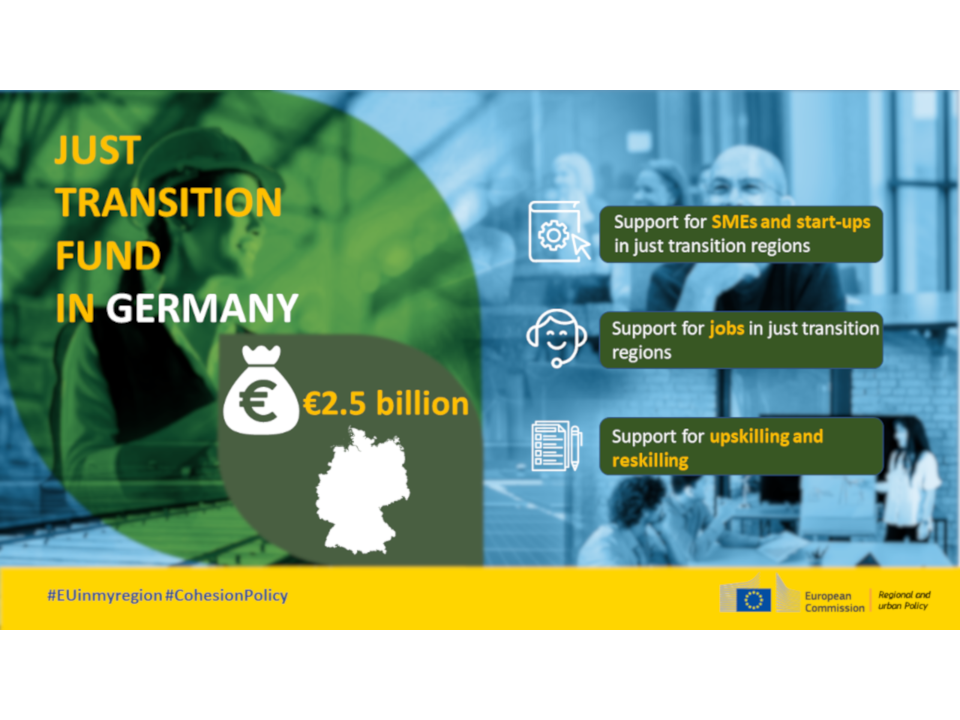Just Transition Fund Announces €2.5 Billion for Climate Transition in Germany

- The German states of North Rhine-Westphalia, Brandenburg, Saxony and Saxony Anhalt are launching the Just Transition Fund programming to support their fair transition to a green economy
- The country has committed to reducing CO2 emissions 65% by 2030 and achieving climate neutrality by 2045
- Successful phase out of coal will be critical.
The €2.5 billion Territorial Just Transition programs will help these four regions making sure that their transition to climate neutrality does not leave anyone behind in the local economy and society.
Executive Vice-President for the European Green Deal, Frans Timmermans, said: “Germany’s commitment to reduce CO2 emissions by 65% still this decade puts the country ahead of European targets. To meet the equally ambitious target of climate neutrality in 2045, a successful phase-out of coal will be important. The Green Deal is built on the premise of proving it’s possible to a socially sustainable climate transition. With support from the Just Transition Fund, Germany can make sure everyone gets to benefit from a green and healthy future.”
Commissioner for Cohesion and Reforms, Elisa Ferreira, said: “The Just Transition Fund will help the German regions most impacted by the green transition – North Rhine-Westphalia, Brandenburg, Saxony and Saxony Anhalt to move away from coal – supporting the reskilling of people and businesses, diversification of the economy, investing in sustainable mobility, digitisation and energy efficiency. The JTF programmes will ensure that on the path to climate neutrality, no one is left behind”.

North Rhine-Westphalia will invest in a sustainable future
North Rhine-Westphalia will receive €680 million. The Northern part of the Ruhr area, the former so called ‘coal pot’ of Europe will move from a coal-based industry to an industry based on renewable energy. Investments will focus on restoring the land of lignite mines and creating new small and medium businesses (SMEs) and start-ups in the green sectors like resource efficiency, circular economy, bio-based alternative raw materials, but also land rehabilitation. This will create new job opportunities.
Moreover, in the Rhenish territory (Rheinisches Revier), the lignite mines and power plants will be closed, and the JTF will invest, in particular, in targeted training and coaching to retain jobs.
See related article: Germany’s RWE Commits to Phase-Out Coal by 2030
Brandenburg will diversify its economy
Brandenburg will receive €785 million to diversify its economy and smoothly move away from a lignite and petrol-based economy. Investments will be made especially in the Lausitzer Revier by supporting innovative SMEs in the green sectors like bio-based materials, resource efficiency and circular economy and the establishment of a hydrogen plant as alternative to the local lignite-based production.
In Schwedt in the sparsely populated Uckermark, where the Germany’s fourth largest oil refinery is located, the JTF will invest in renewable district heating, in an innovation campus and in job training.
New job opportunities in the green sectors will ensure the employment of lignite workers and skilled young people remain to work in the region.
Saxony will focus on renewables and circular economy
In Saxony, €645 million will be invested in a just transition of the Lausitzer Revier, the Mitteldeutsche Revier and of the city of Chemnitz, dependent on a lignite mining and energy production with lignite.
The EU funds will support innovation and the uptake of technologies, mainly focused on renewable energy and circular economy. Raw materials such as gypsum, derived from coal-fired power plants, will be replaced by green, hydrogen-based solutions. Investments will be made in SMEs specialised in green energy and circular economy, which will create new jobs.
Moreover, the Fund will help reskilling almost 1,300 people and expand vocational schools.
Saxony-Anhalt to move to a new economic structure
In Saxony-Anhalt, €364 million will support the greening and phasing out of lignite from of the Mitteldeutsches Revier. The JTF will also support the cleaning-up and renovation of mining sites in a sustainable manner, but also the creation of a new hydrogen infrastructure and of green start-ups and SMEs. Moreover, investments will be made in decentralised transformation centres and sustainable transport in the rural core regions of the Revier.
These projects will create new jobs in the green sectors, like bio-based materials, green hydrogen for industry, and circular economy. Funds will be allocated also for the training of workers in the lignite sector which will enable them to keep an employment. Finally, the Fund will also implement measures in line with the New European Bauhaus, such as the use of alternative raw materials.
Background
The JTF supports the territories that face specific challenges in the transition towards a climate-neutral economy. The identification of these territories is specified in Territorial Just Transition Plans (TJTPs) and it is carried out through a dialogue with the Commission in the framework of the negotiations of the 2021-2027 Partnership Agreements and the associated programmes. The TJTPs, developed in close consultation with local partners, set out the challenges in each territory, as well as the development needs and objectives to be met by 2030. They also identify the types of operations envisaged along with specific governance mechanisms.
The approval of TJTPs opens the door to dedicated financing under the other two pillars of the Just Transition Mechanism (JTM): a just transition scheme under InvestEU and a Public Sector Loan Facility for Just Transition that combines Commission grants with European Investment Bank loans.
The JTM is a key tool to ensure that the transition towards a climate-neutral economy happens in a fair way, leaving no one behind. It provides targeted support to help mobilise around €55 billion over the period 2021-2027 in the most affected regions.
Source: European Commission










